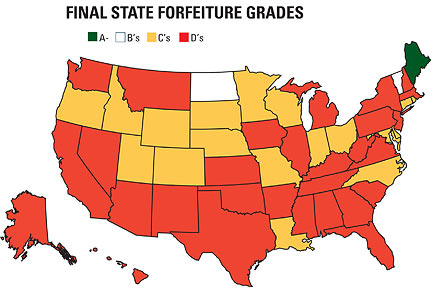We rely on law enforcement agents to keep us safe and treat us all fairly, regardless of race, ethnicity, national origin or religion. We depend on them to act in accordance of the law and to provide us with honorable and equitable service. As long as you are within the borders of the United States, you have rights.
Many encounters with law enforcement are humane, ethical and just. Unfortunately, questionable acts do exist and anyone can potentially become a victim. One example of controversial practices within law enforcement is called civil forfeiture. This term means that civil forfeiture laws allow police to keep or sell cash, cars, homes and other property suspected of being involved in criminal activity. Unlike criminal forfeiture, with civil forfeiture, the property owner doesn’t even have to be charged with, let alone convicted of, a crime to permanently lose his property to the government. Once property is seized, owners are forced to navigate a confusing, complex and expensive process to attempt to win it back before it gets forfeited.
Does this sound fair or unfair? What if your belongings, your property or your hard earned cash or assets were stripped away and never returned based on no proven facts or liability? Alarmingly, citizens in this country are falling victim to such corrupt police and government misconduct. Let’s explore the origins of civil forfeiture as well as the deeper and darker side so you can best protect yourself and understand your rights.
The history of civil forfeiture dates back to hundreds of years ago with roots in the middle 1600’s and the British Navigation Acts. These laws required ships importing or exporting goods from British ports to use British vessels. If ships neglected to abide by this act, the cargo as well as the ship itself, could be seized regardless of whether or not the ship’s owner was guilty of the violation.
During the Colonial years, the early Congress wrote forfeiture laws as an effort to assist federal tax collectors to collect customs duties. This helped finance most of the early expenses of the federal government.
In the Prohibition Era, police seized vehicles and equipment and cash and other property from bootleggers. When Prohibition ended in 1933, the majority of civil forfeiture took a hiatus as well.
Civil forfeiture has made a dramatic comeback in the past 30 years. Activity has increased since the early 1980’s as a result of the nation’s “war on drugs.” The passing of The Comprehensive Crime Control Act in 1984 was a pivotal point in civil forfeiture. This law permitted local and federal law enforcement agencies to divvy up the seized assets and cash. The boundaries of civil forfeiture are tremendously blurred and being pushed to the limit in some cases. The parameters as to what the funds can be used for have expanded. Federal law enforcement is now allowed to keep and spend the money they seize from private property owners. Critics of the procedure say this has created a financial incentive for “policing for profit.” Essentially, police are incentivized to seize goods not for the purpose of fighting crime, but for beefing up department budgets.
According to The Washington Post and a report issued by the Justice Department’s Inspector General, since 2007, The Drug Enforcement Administration has seized more than $4 billion in cash from people “suspected” to have involvement with the drug trade. Only 81% of those seizures (totaling $3.2 billion) were conducted administratively. This means, no civil or criminal charges were brought against the owners of the cash and no judicial review of the seizures ever took place. This statistic doesn’t even include the dollar value of other seized assets such as cars, homes, clothing, electronics, etc.
Furthermore, since 2007, the Department of Justice’s Asset Forfeiture Fund, which collects proceeds from seized cash and property, totals $28 billion in asset forfeiture. In 2014 authorities seized $5 billion in cash and property. That same year, the FBI reports that burglary losses topped out at only $3.5 billion. Law enforcement officers took more property from U.S. citizens than burglars!
On the other hand, according to The Justice Department, there are three main justifications for civil forfeitures:
- Punishment and deterrence. To punish and deter criminal activity by depriving criminals of property used or acquired through illegal activities.
- Enhance police cooperation. To enhance cooperation among foreign, federal, state, and local law enforcement agencies, through the equitable sharing of assets recovered through this program.
- Revenue for law enforcement. As a byproduct, to produce revenues to enhance forfeitures and strengthen law enforcement.
Understandably, civil forfeiture has generated substantial controversy and concern. Based on the historical past of the practice versus current statistics and cases, civil forfeiture seems to be disconnected from its roots. What started as practical necessities of enforcing customs duties has morphed into something substantially different. Civil forfeiture has become a routine tool in law enforcement for fighting, not only drug-related crimes, but a long laundry list of other criminal activities. Over 400 federal laws now grant law enforcement civil forfeiture privileges for a variety of reasons, and every state has followed suit with similar statutes.
Civil forfeiture varies significantly state by state. How does Massachusetts stack up? The Institute for Justice, a non-profit national public interest law firm, gives Massachusetts a final grade of “D” in their Asset Forfeiture Report. Massachusetts earned among the worst grades in the nation for its civil forfeiture laws according to IJ’s rankings. IJ states that Massachusetts law enforcement only needs to provide probable cause that property was related to a crime in order to forfeit it. They keep 100% of all property that is forfeited. The receipts are then split, with half going to the prosecutor’s office and half going to the local or state police.
What types of items can be at risk? Properties that can be seized include real estate property such as a house or motel, cars, cash, jewelry and boats. Also, almost anything suspected of being related to the manufacture and sale and transportation of illegal controlled substances, such as:
- controlled substances
- raw materials needed to make them
- containers to hold them
- vehicles to transport them
- information for manufacture and distribution, such as books, records, and formulas
- money and other valuables “used or intended to be used” to buy or sell them
- property facilitating illegal transactions
- chemicals needed to make them
- machines for making capsules and tablets
- drug paraphernalia
- firearms
For people whose property has been seized through civil forfeiture, legally repossessing their belongings is notoriously complex, difficult and expensive. The costs to get the property back sometimes exceeds the value of the item. In turn, most people do not dispute the seizure or try to fight against it. There is no right to an attorney in forfeiture cases. Defendants are forced to cover all legal expenses. The nature of these claims are complicated and difficult to win. Forfeiture cases are brought against the property, as opposed to the individual. This is very different from other criminal cases where the defendant is innocent until proven guilty. Conversely, forfeiture proceedings start from the position of guilt. Innocence must be proven in court.
The total value of property seized is increasing every year and in return, pushes for more reforms and awareness are coming to light. Please know your rights. Although civil forfeiture cases pose significant challenges, the more knowledge and information you have on the subject, the safer you and your property will be.
It’s imperative to have the knowledgeable Schulze Law Team on your side. If you or someone you know needs assistance, we are here to help you. Contact us by calling 857-300-5300 or visiting our website https://schulzelaw.com/contact-us/
With decades of experience and countless cases behind us, we cover many areas of criminal law. No one should have to fight alone. With Schulze Law on your side, you won’t have to.
If you’ve been arrested, are a suspect in a crime or a victim of civil forfeiture, we can help.
We cannot stress enough the importance of obtaining a strong defense team. The attorneys and staff of Schulze Law are the tenacious, skilled and aggressive attorneys you need to make a positive difference in your life. We will go to bat for your freedom and fair treatment.
Resources:
- http://ij.org/press-release/massachusetts-earns-acanadacana-in-acanapolicing-for-profitacana-report/
- https://www.washingtonpost.com/
- https://www.justice.gov/afp



